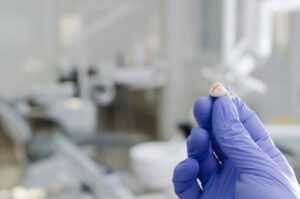
Gum disease is a potentially devastating oral health condition. It can adversely impact your ability to eat a balanced diet and smile with confidence. In its advanced stages, it can even cause your teeth to become loose! If you have been struggling with severe gum disease for a while, you may be contemplating the prospect of getting your teeth removed. But do tooth extractions actually cure gum disease? Or is there another reason why they are frequently part of a periodontal (gum) treatment plan? This blog post provides helpful information.
Are Extractions a Treatment for Gum Disease?
It is important to understand that gum disease (also called periodontal disease) is an infection in the pinkish tissue that surrounds the teeth. It can also affect the jawbone, causing it to weaken and shrink. However, it does not affect the teeth themselves. Therefore, removing teeth that have been loosened by gum disease will not treat the infection that caused them to lose their base of support.
What Is the Role of Extractions in Gum Disease Treatment?
Although extractions do not directly address gum disease, they can play a pivotal role in an overall periodontal treatment plan. Your dentist may recommend that your teeth be removed for a few different reasons:
- To increase your comfort. Loose teeth can make it extremely uncomfortable for you to eat. You may also feel self-conscious about the way your teeth look. Extractions can give you a “clean slate” as you are working to improve your oral health.
- To lower your risk of infection. Loose teeth are in danger of falling out. Getting them professionally removed can lower the risk of an infection at the site of a missing tooth.
- To open the way for gum disease treatment. Removing the teeth can make it easier for your dental team to get rid of the oral bacteria that are causing your gum disease. That is because bacteria can collect in the pockets between the teeth and gums. When the teeth are gone, those areas are much easier to clean.
Replacing Teeth After Extractions
If your gum disease is severe enough that you have to undergo tooth extractions, do not get too downhearted. Talk to your dentist or oral surgeon about your tooth replacement options. After you are free of any active infections, and possibly after a bone graft, you might be able to receive dental implants. Implants are a lifelike way to rebuild lost dentition that can provide you with a strong bite and beautiful aesthetics.
Tooth extractions cannot cure gum disease, but they can move you one step closer to a healthy smile!
Meet the Practice
Dr. Tamir Anver is an experienced oral surgeon who is proud to provide both tooth extractions and dental implants for the Dallas community. If you would like to speak with him and our team about how we can help you bounce back from severe gum disease, get in touch with Texas Wisdom Teeth & Dental Implants at 972-960-1111.

